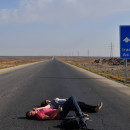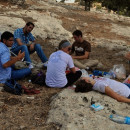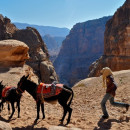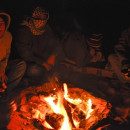CET Jordan: Life Changing Immersion Past Review
By Mark R (International Relations and Arabic, Tufts University) for
CET Jordan
I learned an incredible amount about Arabic language and culture. I cannot overstate how much this program helped me to progress. When I go back to continue studying Arabic, it will probably be with CET.
Review Photos




Personal Information
| How much international exposure did you have prior to this program? | 6 months+ |
Review Your Program
|
* Overall educational experience
Academic rigor, intensity, resources, etc. |
Because the program is a language program, its hard to separate the learning experience in and out of the classroom. The classes themselves were good. They enabled us to practice extensively under the supervision of well trained professors, and this helped us expand our vocabulary and gain new confidence speaking. One advantage that the program academics has over an American study program is that we practiced a lot. Every night for homework, we read news articles (from real Arabic news websites) and every morning we discussed them in class. In MSA class, we had great discussions about political and social topics, and I learned how to talk about these things in new ways. In colloquial class, we learned how to transition into more natural speech. Every day we conversed, listened to the radio, and acted out hypothetical situations. Every week, we wrote a long essay on a topic of interest. The importance of this practice cannot be overstated. In terms of formal MSA structure and grammer, the program has room for a little improvement. I came back to America and found that my formal language had gotten more fluid but at the same time a tiny bit sloppy. There were a few colloquial words and pronunciations mixed into my speech, and I had fallen out of practice with case markings and other advanced grammer topics. But after a few weeks back in class, this all came back to me, and I was none the worse for having missed the semester here. Yes, there is a big opportunity to strengthen CET's classroom education if the instructors would bring the grammar instruction up to the same level as it is in American Universities. In that case, students would come back very advanced with respect to grammar. At the same time, a student who studies in CET shouldn't suffer from the lack of focus on case endings and things like that. If you sit down for a day or two with al-Kitaab when you get back, you should be all caught up. There are a few other opportunities for improvement in the subject courses. In Islamic Civilization, the professor taught us some excellent and advanced concepts in Middle Eastern historiography, but we didn't learn a whole lot of new information. The most important thing was that it taught us how to talk about history in Arabic. The Media Class was the same way. It didn't teach us much new information, but it taught us how to follow Arabic media and how to talk about it in an advanced way. In the future, these classes can be strengthened a bit. But as it is now, any student can benefit immensely from the conversations in these courses. Altogether, the instruction provided us all the tools that we needed to progress. Those of us who put our minds to studying made huge gains in our vocabulary - I estimate that I doubled or tripled the words in my working vocabulary - and gained a great deal of practice in reading and writing. The professors pushed us to a point where we were able to focus less on the language itself than on the ideas that we were conveying - which was a huge achievement. By the end of the time in the country, I felt very confident in my MSA abilities. |
|
* Host Country Program Administration
On-site administration of your program |
The administration was very familiar with both America and host country, and very competent. Given the young age of the program, the administrator was very flexible and responsive. (Although maybe a little too responsive, depending on your opinion, as the administrator listened to students complaining of too much homework and reduced the load.) Best of all, the administration was friendly, personable, and fun. |
|
* Housing:
How satisfied were you with your living arrangements? |
The apartment wasn't much to look at, and had some issues with water and heat, but since I left, the students have moved into much nicer apartments. Living with a Jordanian student was the best part of the program for me. We would talk together for hours each day, and we formed a great friendship. My housemate was undoubtedly the most helpful person to my language progress. |
| * Food: |
Jordanian food can get a bit monotonous after a while, but so can food in a lot of foreign countries where the diets aren't as varied as ours. Altogether, food was cheap, somewhat healthy, and buying it provided a great chance to meet more locals. I did a lot of shopping in the central market in Irbid, and it was great to meet people, practice Arabic, and get free vegetables. My cooking was absolutely awful. But we know whose fault that is.. |
|
* Social & Cultural Integration:
How integrated did you feel with the local culture? |
Trips to Umm Qais, Wadi Rum, Petra, Jerash, Ajloun, Amman. All were a lot of fun. |
|
* Health Care:
How well were health issues addressed during the program? |
|
| * Safety: |
I felt very safe in Irbid and surrounding area. |
| If you could do it all over again would you choose the same program? |
Yes
|
Finances
|
* Money: How easily were you able to live on a student's budget?
(1 = not very easy/$200+ on food & personal expenses/week, 2.5 = $100/week, 5 = very easily/minimal cost) |
|
| Not including program expenses, about how much money did you spend on food and other expenses each week? | I ate very cheaply, but keeping an eye on costs and cooking for myself a lot. I think I spent about 20 dinar ($30 USD?) on meals per week, with another 5 dinar or so ($7.50 USD?) on chocolate and snacks. As for incidentals, there wasn't much besides notebooks and pens. I saved this money so I could travel a lot on the weekends and buy souvenirs. I did make some expensive weekend trips. In four months in the country, paying for food, extra warm clothes, travel to two other countries, and several trips, came out to be almost exactly $2600. |
| Do you have any general money-saving tips for future study abroad participants? | Shop where the locals shop and eat how they eat. Vegetables from the market are a lot cheaper than frozen food from the grocery store. Take public transportation (bus) instead of taxi. Talk to locals before you plan your trip to make sure you know the cheapest way to do things. Drink your coffee where the college students do, not at the fancy hotels and cafes. |
Language
| * Did your program have a foreign language component? | Yes |
| How would you rate your language skills at the beginning of the program? | Beginner |
| What was the highest level language course you had completed prior to departure? | Fourth semester Arabic |
| If applicable, to what degree did your living situation aid your language acquisition? |
|
| Language acquisition improvement? |
The training in colloquial Arabic was great. Yes, there are a lot of opportunities for the in-class instruction to improve. But at the same time, our teachers gave us the tools that we needed to learn colloquial outside of the classroom, which worked well. The program gave us language partners, who turned out to be great friends and invaluable teachers. We signed a pledge to speak Arabic 24/7, which, although challenging at times, got us into the mindset where we began to really get the feel of the language. The program also made it a point to get us out onto the streets - through living with Arabs in apartments off campus, as well as fun events like scavenger hunts. CET is very committed to immersive learning, and this was the best part of the program. There is really no other program in Jordan that gets you out into the streets interacting with, making friends with, learning with, and living with native Arabic speakers. By the time I left Jordan, I felt very proficient in colloquial Arabic. I could have long and in depth conversations with any Jordanian (except the Bedouin) on mostly any topic, I could express my feelings and emotions, I could stay up all night with Jordanian friends telling jokes, I could charm my way into getting free taxi rides in Irbid, I could charm my way into free visas at the border, and most importantly, I was able to develop real and deep friendships. |
Other Program Information
|
* Where did you live?
Select all that apply |
|
|
* Who did you live with?
Select all that apply |
|
|
* Who did you take classes with?
Select all that apply |
|
A Look Back
| * What did you like most about the program? |
|
| * What could be improved? |
|
| * What do you know now that you wish you knew before going on this program? | If you are self-motivated, hard working, and are looking for an authentic immersion experience that will enable you to learn Arabic from native speakers - this is without a doubt the program for you. |








